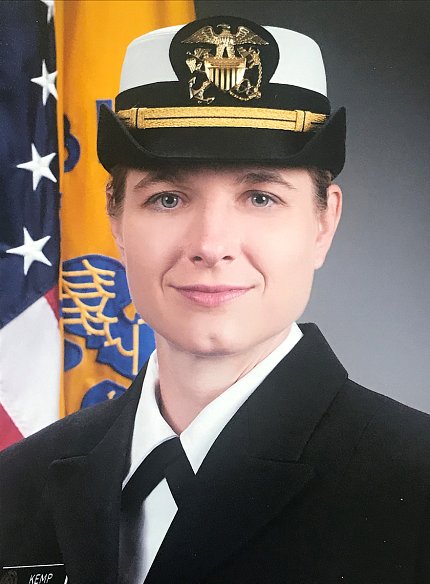NIH’er Adjusts to New Reality After Returning from Deployment

“I stepped back into a completely different world.” That’s how Lcdr. Maggie Kemp described her experience returning to work at NIH after a Public Health Service deployment.
In March, Kemp, acting chief of the ORS Division of Occupational Health and Safety’s (DOHS) Safety Operations and Support Branch, was part of the PHS response to support passengers who had returned to the United States on the Grand Princess cruise ship. Nearly 3,000 people quarantined for 14 days at military bases across the country.
Almost 500 people completed their quarantine at Marine Corps Air Station Miramar, a military base near San Diego, where Kemp was deployed. She helped to ensure the safety of patients as well as members of the National Disaster Medical System and PHS responders.
“I wasn’t really in touch with staff at NIH while I was gone,” she said. “We were working 15-, 16-hour days. It was crazy. I was very isolated from what was happening in the world and in San Diego outside of the base, because we were working such long hours every day.”
Before she left, the possibility of shutting down research at NIH was mentioned and her office began drafting potential guidance for closing labs. While she was away, she heard NIH employees were teleworking, but she didn’t know the details—she wasn’t involved in the decision-making process.
When she came back to campus, all eligible employees were teleworking to the extent possible. The first week back was stressful. It took a few days for Kemp to figure out what had changed and how. Like other parents, she had to balance work, child care and home schooling. Slowly, however, telework has become the “new norm.”
For Kemp, teleworking has been a new experience. She has assisted in past natural disaster response for the PHS. During the 2014 Ebola outbreak in West Africa, she stayed at NIH to work in an Ebola lab.
Her branch consists of a team of safety specialists that support the registered lab spaces on campus to ensure that all laboratories follow safety guidelines. Right now, they are only actively supporting labs that are conducting Covid-19 research or those that received exemptions to continue.
Several PHS members and a National Guard reservist work in DOHS. Other employees have gone on detail to other offices to help with NIH’s Covid-19 response. Many of Kemp’s colleagues have been away much of the time. Those remaining have had to juggle more responsibilities and coordinate who’s doing what.
Despite the additional responsibilities, working with the remaining staff “has been really great,” she said. “They’ve been really flexible and very good about the shifting of duties and taking on different tasks…As PHS officers, we’re supposed to be there regardless.”
During this uncertain time, many employees are concerned about their own health and that of their families and friends, in addition to accomplishing their work and meeting personal responsibilities, Kemp noted.
“I appreciate the flexibility we’ve been given by NIH leadership and management,” she concluded.
